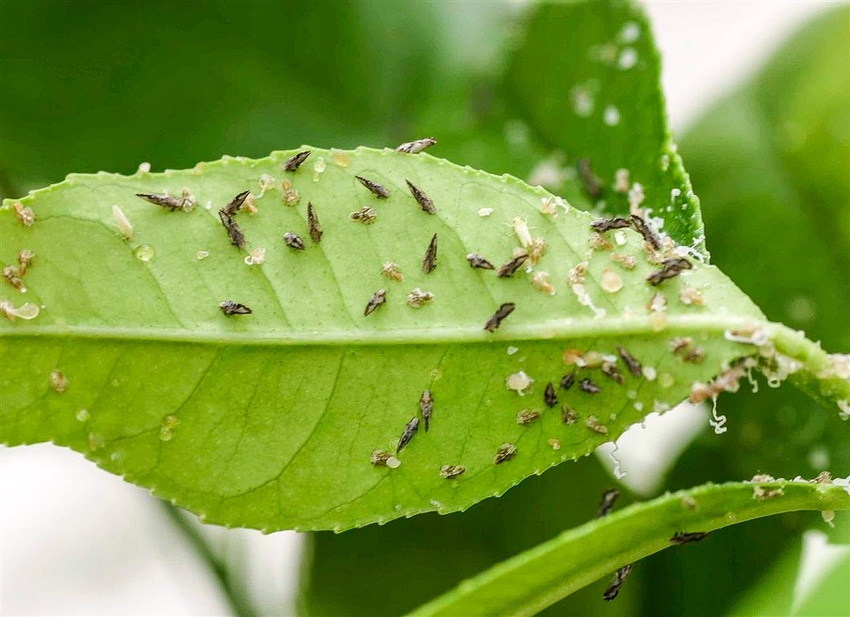
Despite holiday season discoveries of six Asian citrus psyllids in Tulare County, Calif. and a single find in a residential tangerine tree in the Ojai Valley of Ventura County, state citrus industry officials are hopeful a possible program being planned can eradicate the pest from the San Joaquin Valley and areas where it is not firmly established.
It is too early to announce detailed plans, according to Bob Blakely, director of industry relations with the California Citrus Mutual (CCM). Meetings are still being held and details discussed into what such a program could look like in Central California.
According to Blakely, the idea is to encourage citrus growers to participate in a coordinated treatment effort to spray trees for the ACP. This effort would be voluntary since it is not part of a regulatory process. It would have to include coordinated efforts by organic and non-organic growers to be most effective, Blakely said.
“We would much prefer to see an area-wide, coordinated treatment program to eradicate the psyllids out there,” he said. “You can’t just have one guy spraying and the remaining psyllids moving to another grove.”
One issue with such a plan is the effectiveness of products approved for use by certified organic growers and the host of longer-lasting, more effective products available to non-organic growers.
Blakely said Florida has been conducting a coordinated approach and growers in Texas appear to be having some success in knocking down psyllid populations there with their coordinated efforts. Still, it takes only one ACP to vector the deadly Huanglongbing disease that citrus growers fear.
Discussions of the citrus industry plan comes as six new psyllid discoveries were made in Tulare County during the holiday season as part of ongoing trap inspections by the California Department of Food and Agriculture. Four ACPs were discovered on traps in a current quarantine zone in the Richgrove area of southern Tulare County, and two more on traps at different citrus juice plants in the county.
The Richgrove-area find was discovered Dec. 23 and the juice plant discoveries made Jan. 3, according to Tulare County Ag Commissioner Marilyn Kinoshita. Three of the four Richgrove traps were reportedly in commercial orchards with the fourth at a ranch home, she said.
One of the ACP discoveries was made at the Odwalla juice plant in Dinuba, Calif. One citrus industry representative said the Odwalla plant is “a stone’s throw” away from last September’s discovery of a psyllid infestation in three young trees in a residential neighborhood. To speculate whether the psyllids discovered at the juice plant came in on a truck or citrus shipment would not necessarily be accurate.
The other juice plant where a psyllid was trapped is operated by Ventura Coastal and Sunkist in Tipton. It is located in the southern end of Tulare County, next to Highway 99 and not in any current ACP regulatory zone. That plant receives shipments of citrus from the desert regions of southern California and elsewhere, Kinoshita said.
Traps at the processing plants are inspected on a two-week cycle, Kinoshita said.
Other than to suspect the Tipton juice plant discovery was the result of hitchhiking psyllids, it is unclear whether they came in on citrus loads or through some other means, Kinoshita said. Aside from a small residential area where there may be some citrus trees in people’s yards, there is no commercial citrus close to the Tipton facility.
As ACP discoveries were made in Tulare County throughout the summer months last year, state regulators established and eventually expanded quarantine zones to cover hundreds of square miles of Central California’s citrus region from northern Kern County to southern Fresno County.
While there is no countywide ACP quarantine in Tulare County, as is the case in several southern California counties including Ventura County, some people have suggested agricultural officials declare all of Tulare County an ACP quarantine zone in an effort to combat the invasive pest. Not everyone agrees this is the best method.
Blakely says that there has been no such call from CCM as officials there remain hopeful that smaller, more targeted quarantine zones can contain the ACP while the industry works on ways to eradicate it from the San Joaquin Valley.
“That call would have to come from me,” Kinoshita said of the countywide declaration. “We’re not ready to do that yet.”
About the Author(s)
You May Also Like






